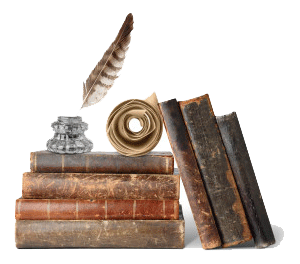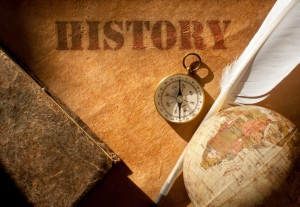 Do you know what skills you need to craft a good historical narrative?
On Thursday, June 12, 2014, I attended “Fact and Fiction: Writing Historical Narratives,” a panel at the 35th Annual Conference on New York State History. The panel consisted of chair Michael McGandy (Editor, Cornell University Press) and 3 authors: Jessica DuLong, Tom Lewis, and Christine Wade.
Do you know what skills you need to craft a good historical narrative?
On Thursday, June 12, 2014, I attended “Fact and Fiction: Writing Historical Narratives,” a panel at the 35th Annual Conference on New York State History. The panel consisted of chair Michael McGandy (Editor, Cornell University Press) and 3 authors: Jessica DuLong, Tom Lewis, and Christine Wade.
In this post you will learn what these authors had to say about the skills they needed, and the challenges they faced, to produce strong historical narratives, memoirs, and historical fiction.
The Memoirist
Jessica DuLong came to write history accidentally.
After being laid off from her dot-com job as a journalist, DuLong found herself in the engine room of the antique fireboat John J. Harvey during a volunteer day. Her day of service led to a job.
[simpleazon-image align="right" asin="B005FOIBXO" locale="us" height="400" src="http://ecx.images-amazon.com/images/I/51ChVc0IzwL.jpg" width="221"]DuLong worked in the engine room of the John J. Harvey as it plied the waters of the Hudson River and New York Harbor. Her work led her to wonder what Americans had lost as they shifted away from hands-on work to more intellectually-based work. These musings prompted her to write [simpleazon-link asin="B005FOIBXO" locale="us"]My River Chronicles: Rediscovering the Work that Built America[/simpleazon-link].
As a journalist, DuLong approached her writing with a desire to put the “story” back into history. She found her story in the people she described. For DuLong, “the lifeblood of your story is the people.”
Every time DuLong became stuck in her writing, she returned to the interviews she recorded and re-listened to them. This act helped her reconnect with both the people in her story and the history she wanted to narrate.
DuLong closed her remarks by telling the audience that writing is not easy because writers have a tough job, they must “convince the reader to keep reading with every sentence.”
The Historian
Tom Lewis, the author of 4 books, including [simpleazon-link asin="0300119909" locale="us"]The Hudson: A History[/simpleazon-link], laid out his 4-step approach to research and writing.
Step 1: Identify a Topic
Lewis finds choosing a topic to be the hardest part about writing.
Step 2: Disregard and Discard Preconceived Ideas
Lewis aims to write fair and impartial narratives. He has found that in order to be impartial he must disregard and discard all of his previous ideas about his chosen topic.
By creating and keeping an open mind, Lewis allows the sources he finds to direct his writing.
Step 3: Conduct Interviews
[simpleazon-image align="right" asin="0300119909" locale="us" height="430" src="http://ecx.images-amazon.com/images/I/5170sd6oR6L.jpg" width="302"]Lewis conducts interviews to get at the heart of his stories.
He cautioned that the person who conducts the interview must remember that people lie.
Lewis suggested that interviewers should get control of their interviewee quietly. He acknowledge that this involves a bit of manipulation.
A good interviewer will always find a way to bring out new memories. New memories are less prone to false information because the interviewee has not had the same opportunity to modify these new stories like they do with those that they tell repeatedly.
Step 4: Don’t Drown in Your Research
Lewis acknowledged that this step is easier said then done.
In the age of the internet, “we stand under a Niagara Falls of information.”
Lewis tries to take control of his topic by walking around the issue. He researches people and events related to his topic before he studies his topic directly. This way he knows which angles of his story are worth pursuing and which angles he should avoid.
Lewis concluded his remarks with 3 tips:
1. Write like a homebuilders. Words serve as the building blocks for any narrative. You want to build an inviting house that has an elegant structure and creates an inviting place where readers want to spend time.
2. "Revise, revise, revise.” Only through revision can you shape your book.
3. Trust your editor. Editors can help you craft an excellent book if you let them.
The Novelist
[simpleazon-image align="right" asin="1451674708" locale="us" height="500" src="http://ecx.images-amazon.com/images/I/51QBYE88fGL.jpg" width="322"]Christine Wade works as an epidemiologist and she approached the research for her award-winning novel, [simpleazon-link asin="1451674708" locale="us"]Seven Locks[/simpleazon-link], as she would a scientific problem.
Wade admitted that the best part about writing historical fiction is that it is fiction. She does not have to be accountable for portraying the history with 100% accuracy.
With that said, Wade stated that works of historical fiction must have 2 components: strong characters and strong context.
While novelists can play with historical accuracy, they still need to research the period of their setting to make their work feel real.
Wade situated Seven Locks at the foot of the Catskill Mountains just before the American Revolution. In order to give her setting and characters a period feel, Wade read a lot of 18th-century works such as Washington Irving’s [simpleazon-link asin="0143105612" locale="us"]A History of New York[/simpleazon-link], Laurence Sterne’s [simpleazon-link asin="0141439777" locale="us"]The Life and Opinions of Tristram Shandy, Gentleman[/simpleazon-link], and the works of Samuel Johnson.
Wade also had to develop an authentic voice for her characters, an element that would help her characters to serve the history and story she wanted to tell.
Wade found her voice by relying on her linguistic abilities. Wade does not speak Dutch, but she speaks a different northern European language (she did not say which one) and she used her knowledge of this language to shift the syntax in her character’s speech just as she would move the syntax if she attempted to speak her other language.
Wade concluded her remarks with a bit of advice she acquired from Samuel Johnson: the task of the author is to teach what is not known, or to shed new light upon what is known by offering a new perspective.
 Audience Q & A Highlights
Audience Q & A Highlights
Should you begin writing or find an editor first?
DuLong: DuLong wrote a book proposal, which she used to find an agent.
She wrote a 70-page proposal for her first book. The proposal required her to think about the structure and narrative of her book. She met with agents at writing conferences and submitted her proposal to the agents she spoke with.
Presently, she is writing a second book about 9/11. She had no intention of writing the book, but an editor reached out after they read an article DuLong had posted on Huffington Post.
Lewis: Lewis started with an idea and his friend helped him find an agent.
Lewis wrote his first book about the history of radio. A friend encouraged him to get the project into the hands of an agent. When Lewis seemed slow to do so, his friend put in a call to her agent and the agent asked Tom for a proposal. Tom wrote a 6-page proposal and sent it to the agent who shopped the book around.
Wade: Wade finished her book and then looked for a publisher.
Wade did not plan to write a novel. However, an idea came to her while she was between jobs and she wrote the book on a whim because she thought it would be fun. She did not even tell her family that she was writing a book until she had finished it.
Wade got a new job before she finished her book and had to develop an early-morning writing ritual that allowed her to finish it. Her ritual consisted of an hour of writing each morning before work and thinking about her book as she rode the train to work. When she arrived at her office, she would write down all of the ideas she had thought of and she would use those notes during her writing time.
Wade sent her book to agents and received a lot of rejections. Eventually she found an agent willing to read her book, but the agent said it would take her 3 months to get to it. In the meantime, Wade found out that she won an award for her novel. The agent got back to her after 3 months and helped her publish her book.
Question for Tom Lewis: How do you psychologically prepare yourself to shed information that you cannot put into your story? How do you know when documents won’t help you tell the story you want to tell?
Lewis: Lewis stated that he views the writing process as he does a Rubik’s Cube; he wants all of the faces of the cube to line up. Lewis tries to see the shape of his book and then attempts to fit all of his evidence and ideas into that shape. If an interesting document doesn’t work on his Rubik’s Cube, Lewis leaves it out be because ultimately you cannot fit every piece of evidence into your story.
Conclusion
DuLong, Lewis, and Wade approached the panel from 3 different historical genres. However, each offered similar advice that related to the fact that “story” makes history fun and enjoyable to write and to share with readers.
 What Do You Think?
What Do You Think?
Which tip or piece of advice did you find most helpful?









